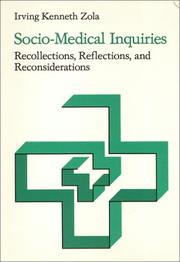| Listing 1 - 10 of 607 | << page >> |
Sort by
|
Book
Year: 1982 Publisher: Leuven : Sociological Research Institute - K.U. Leuven, Division for Medical Sociology,
Abstract | Keywords | Export | Availability | Bookmark
 Loading...
Loading...Choose an application
- Reference Manager
- EndNote
- RefWorks (Direct export to RefWorks)
Social medicine --- Medical sociologists --- Social medicine. --- History. --- Research

ISBN: 0877223122 Year: 1983 Publisher: Philadelphia (Pa.): Temple university press
Abstract | Keywords | Export | Availability | Bookmark
 Loading...
Loading...Choose an application
- Reference Manager
- EndNote
- RefWorks (Direct export to RefWorks)
Medical sociologists --- Social medicine --- Biography --- Zola, Irving Kenneth,
Book
ISBN: 0824880765 082481102X Year: 2019 Publisher: Honolulu, Hawaii : University Press of Hawaii,
Abstract | Keywords | Export | Availability | Bookmark
 Loading...
Loading...Choose an application
- Reference Manager
- EndNote
- RefWorks (Direct export to RefWorks)
Public health --- Medical care --- Social medicine --- Medical sociology --- Medicine --- Medicine, Social --- Public welfare --- Sociology --- Medical ethics --- Medical sociologists --- Social aspects
Book
ISBN: 0826108776 9780826108777 9780826108760 0826108768 Year: 2014 Publisher: New York, NY Springer Publishing Company, LLC
Abstract | Keywords | Export | Availability | Bookmark
 Loading...
Loading...Choose an application
- Reference Manager
- EndNote
- RefWorks (Direct export to RefWorks)
This clear and accessible guide-written by social workers for social workers-describes the most current developments in neuroscience and their practical applications for social work in education, child welfare, health, mental health, and criminal justice settings. The contributions of social work experts in these key areas of practice make this vast and ever-expanding body of neuroscientific knowledge easily understandable, with specific relevance to understanding the impact of the environment on neural mechanisms and human life course trajectories. The text examines how neuroimaging can be us
Social medicine. --- Medical care --- Medical sociology --- Medicine --- Medicine, Social --- Public health --- Public welfare --- Sociology --- Medical ethics --- Medical sociologists --- Social aspects
Book
ISBN: 1108605893 1108670881 1108610455 1108426492 1108796141 9781108610452 9781108670883 9781108426497 Year: 2018 Publisher: Cambridge, United Kingdom New York, NY
Abstract | Keywords | Export | Availability | Bookmark
 Loading...
Loading...Choose an application
- Reference Manager
- EndNote
- RefWorks (Direct export to RefWorks)
The book analyses how policies to prevent diseases are related to policies aiming to cure illnesses. It does this by conducting a comparative historical analysis of Australia, Germany, Switzerland, the UK, and the US. It also demonstrates how the politicization of the medical profession contributes to the success of preventative health policy. The book argues that two factors lead to a close relationship of curative and preventative elements in health policies and institutions: a strong national government that possesses a wide range of control over subnational levels of government, and whether professional organizations (especially the medical profession) perceive preventative and non-medical health policy as important and campaign for it politically. The book provides a historical and comparative narrative to substantiate this claim empirically.
Social medicine. --- Medical care --- Medical sociology --- Medicine --- Medicine, Social --- Public health --- Public welfare --- Sociology --- Medical ethics --- Medical sociologists --- Social aspects
Book
ISBN: 9811625468 981162545X Year: 2021 Publisher: Gateway East, Singapore : Springer,
Abstract | Keywords | Export | Availability | Bookmark
 Loading...
Loading...Choose an application
- Reference Manager
- EndNote
- RefWorks (Direct export to RefWorks)
Social medicine. --- Medical care --- Medical sociology --- Medicine --- Medicine, Social --- Public health --- Public welfare --- Sociology --- Medical ethics --- Medical sociologists --- Social aspects
Book
ISBN: 1009236822 1009236865 1009236849 1009236857 9781009236843 9781009236850 9781009236867 9781009236829 Year: 2022 Publisher: Cambridge, United Kingdom ; New York, NY : Cambridge University Press,
Abstract | Keywords | Export | Availability | Bookmark
 Loading...
Loading...Choose an application
- Reference Manager
- EndNote
- RefWorks (Direct export to RefWorks)
Collaboration-based approaches to healthcare improvement attract much attention. They involve networks of people coming together to cooperate around a common interest, with shared goals of improving care and mutual learning. Longstanding examples of collaborative approaches have been associated with some success in improving outcomes and reducing harm. The evidence for their effectiveness and cost-effectiveness, however, remains inconsistent and contingent on the circumstances in which they are deployed and how they are used for what purpose. Several models for collaboration have been developed, varying in structure, format, and balance between internal leadership and external control. The authors focus on two approaches: quality improvement collaboratives and communities of practice. They explore evidence of their impact on health outcomes, and evidence about how best to organise and implement collaboration-based approaches. Using examples of more and less successful collaborations, they offer guidance on the key challenges involved in using collaboration-based approaches to improve healthcare. This title is also available as Open Access on Cambridge Core.
Social medicine. --- Medical care --- Medical sociology --- Medicine --- Medicine, Social --- Public health --- Public welfare --- Sociology --- Medical ethics --- Medical sociologists --- Social aspects
Periodical
ISSN: 18834477 09169202 Year: 1991 Publisher: Tōkyō-to : Iryō Kagaku Kenkyūjo
Abstract | Keywords | Export | Availability | Bookmark
 Loading...
Loading...Choose an application
- Reference Manager
- EndNote
- RefWorks (Direct export to RefWorks)
Social medicine. --- Social Medicine. --- Health Sciences --- Public health --- Medical care --- Medical sociology --- Medicine --- Medicine, Social --- Social aspects --- Public welfare --- Sociology --- Medical ethics --- Public Health --- Medical sociologists

ISBN: 0813517575 0813517567 9780813517575 9780813517568 Year: 1997 Publisher: New Brunswick, N.J.: Rutgers University press,
Abstract | Keywords | Export | Availability | Bookmark
 Loading...
Loading...Choose an application
- Reference Manager
- EndNote
- RefWorks (Direct export to RefWorks)
Medicine --- Social medicine --- Medical care --- Medical sociology --- Medicine, Social --- Public health --- Public welfare --- Sociology --- Medical ethics --- Medical sociologists --- History --- Social aspects --- Health Workforce --- Medicine - History
Book
ISBN: 9811319758 981131974X Year: 2019 Publisher: Singapore : Springer Singapore : Imprint: Palgrave Macmillan,
Abstract | Keywords | Export | Availability | Bookmark
 Loading...
Loading...Choose an application
- Reference Manager
- EndNote
- RefWorks (Direct export to RefWorks)
Are painkillers mundane medications safe for use to ease human suffering? Or are they drugs of abuse that cause addiction and death? Do they ameliorate pain, or do they cause it? This book explores growing interest among medical practitioners media outlets about the ‘misuse’ or ‘abuse’ of pharmaceutical pain medications. It contextualizes these emerging discourses of pharmaceutical ‘abuse’ within the social and political histories from which they have emerged by exploring the role of pleasure and pain in shaping individualized modes of medication consumption in a neoliberal age of anxiety. The book is divided into two parts: the first addresses the discursive construction of painkiller (ab)use as articulated in research and policy accounts; the second part provides an empirical investigation that draws on the lived experience of those who engage in non-medical consumption. This book argues that, contrary to the stereotype of the ‘seductive’ drug that coaxes its user into a life of dysfunction, there appears to be an intimate relationship between the motivations of pleasure seeking, health practice and productive citizenship among people who use painkillers for non-medical reasons.
Social medicine. --- Medical Sociology. --- Cultural Studies. --- Medical care --- Medical sociology --- Medicine --- Medicine, Social --- Public health --- Public welfare --- Sociology --- Medical ethics --- Medical sociologists --- Social aspects
| Listing 1 - 10 of 607 | << page >> |
Sort by
|

 Search
Search Feedback
Feedback About UniCat
About UniCat  Help
Help News
News